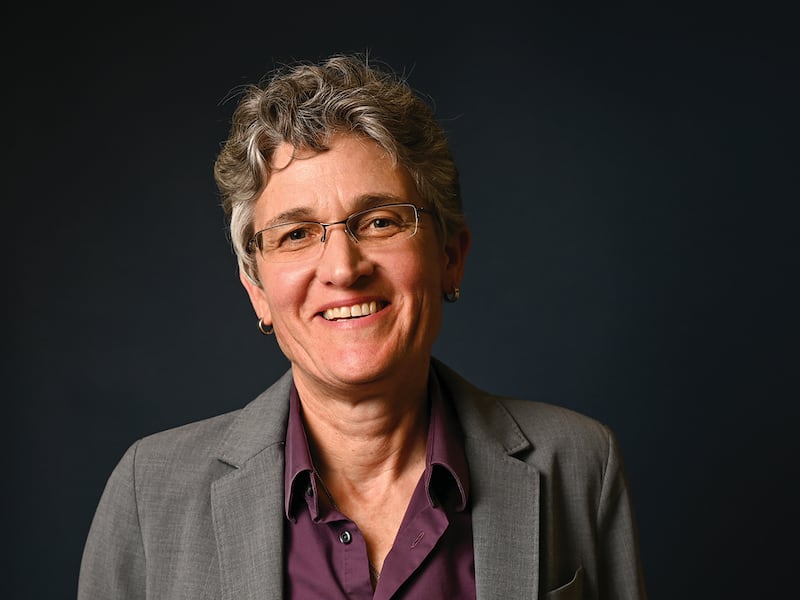U.S. Senate
Ron Wyden
Democrat
Wyden, 73, has been serving in Washington, D.C., for a while. He first won election to the House in 1980—the year Ronald Reagan unseated President Jimmy Carter—and moved up to the Senate in 1996.
He doesn’t appear to have lost a step. Wyden holds a town hall in each of Oregon’s 36 counties at least once a year—he’s done more than a thousand of them. In conversation, he displays an encyclopedic knowledge of policy and people with an enthusiasm undimmed by repetition or rubber chicken dinners.
When the pandemic hit, Wyden, the chairman of the Senate Finance Committee, pushed through additional insurance benefits for the millions of Americans who lost their jobs. He passed a law raising the corporate minimum tax to 15% (many profitable corporations previously dodged federal income taxes completely) and was instrumental in the Inflation Reduction Act, which despite its gimmicky name, includes mammoth investments in green energy, which will be helpful to Oregon and provide new resources to the Internal Revenue Service to pursue tax cheats, long a passion of Wyden’s. He also plugged into that bill a requirement that drug companies negotiate the price of high-cost medications with the Centers for Medicare & Medicaid Services.
By dint of his seniority and usefulness, Wyden has plum committee assignments, in addition to his chairmanship of Finance: he sits on Energy and Natural Resource, Budget, and the Select Committee on Intelligence, and has been the Senate’s leading watchdog for personal privacy.
Oregon Republicans have abandoned any pretense of challenging Wyden. This year, they nominated Jo Rae Perkins, 66, a perennial candidate from Albany. Although Perkins has never held office of any kind, she is making her third run for the Senate since 2014 and has also run twice for Congress. An anti-vaxxer, Trump enthusiast and election-result denier, she has embraced QAnon in the past. Also in the race: Dan Pulju, 51, the Pacific Green Party nominee from Eugene, who is running on an anti-war platform, and Progressive Party nominee Chris Henry, 58, a truck driver from Milwaukie.
We enthusiastically recommend a vote for Wyden.
On the menu for Wyden’s last meal: Perhaps the senator’s most impressive accomplishment is having eaten at each of the 51 Fred Meyer stores in Oregon. He’d sign off with a Freddy’s chicken dinner and a Private Selection cherry pie.
U.S. House District 1
Suzanne Bonamici
Democrat

Bonamici, 68, a longtime lawyer, has been in Congress since 2012, representing a sliver of Portland and much of rural Oregon west of here, from Sheridan in the south through Washington, Columbia and Clatsop counties, all the way to Astoria.
Thanks to redistricting, Bonamici’s district now reaches much deeper into Portland, including downtown, the South Waterfront, and Southeast Portland out to César E. Chávez Boulevard. Now, 23% of her district is in Multnomah County, up from just 8%.
Lucky her. The new district plunges Bonamici into what is probably the thorniest issue facing the city right now: homelessness.
We pressed Bonamici on the issue during our endorsement interview, asking what a federal official could do to help remedy a state and local problem. Specifically, she recommended more investment in low-income housing vouchers. More generally, she said the government must do more to increase housing construction. Low-income units must pencil out for developers, and we must find more skilled people to build them.
With downtown Portland in her purview, we wish Bonamici had been more specific about her solutions to homelessness and more detailed in her answers to our other questions.
On offshore wind turbines in Oregon? “I’m definitely supportive of doing all we can to transition to clean energy.” On a transmission line to carry clean electricity between Oregon and Idaho that Idaho Power has been trying to push through a thicket of bureaucracy for 14 years? “Grid is infrastructure. Of course we need a way to transmit energy.” She was no more granular on whether land in Washington County should be used for semiconductor plants or farming.
Don’t get us wrong. We appreciate Bonamici’s aye votes on constructive legislation like the CHIPS and Science Act to bring semiconductor manufacturing to the U.S.; the Infrastructure Investment and Jobs Act, which will improve Oregon’s roads and bridges; and the Inflation Reduction Act, which will support clean energy and lower the cost of insulin for seniors.
There is almost no chance that Bonamici will lose her seat, even as she tries to straddle issues in Portland and, now, thanks to redistricting, Tillamook County, where Timber Unity signs dot the cow pastures and clear cuts.
Her Republican opponent, Chris Mann, 59, is a political novice. He’s a super-nice guy, with a record of military service. After active duty in the Army from 1984 to 1989, the 9/11 attacks spurred him to return for two tours in the Middle East. But he doesn’t have command of the issues, and like so many candidates that the GOP puts up in strongly Democratic districts, he would be learning on the job.
So, we’ll take Bonamici and urge her, next time, to bore us with the details.
On the menu for Bonamici’s last meal: Rigatoni, with her late father’s tomato sauce.
U.S. House District 3
Earl Blumenauer
Democrat

New boundaries shifted this historically Portland-centric district east. It now extends to Hood River County, having surrendered a big chunk of Portland to the 1st Congressional District. But it remains by far the most lopsided district from a partisan point of view, with registered Democrats outnumbering Republicans by more than 3 to 1.
That means another easy victory for incumbent Earl Blumenauer, 74, who has held this congressional seat since 1996, when he succeeded Ron Wyden. As the congressman most representative of Portland, Blumenauer has made the city’s issues his own: the promotion of transit and cycling, federal cannabis legalization, and sustainable agriculture, to name a few.
Blumenauer is such an institution he’s getting infrastructure named after him. On July 31, the city of Portland opened its newest span, the Blumenauer Bridge, which carries bicyclists and pedestrians across Interstate 84 at Northeast 7th Avenue. It’s a tribute to a native son of Southeast Portland who served in the Oregon Legislature and on the Multnomah County Commission and Portland City Council before decamping for Washington, D.C.
There, he serves on the budget-writing Ways and Means Committee. Blumenauer co-wrote the Green New Deal and distinguished himself during the Trump era for his vocal opposition to the president.
For the past two years, he has tried to expand earlier wilderness protections he helped cement for federal lands around Mount Hood, although conservation groups have criticized him for not doing more. (Blumenauer hopes to pass a bill in the post-election “lame duck” session.) He has also worked hard to end federal restrictions that prevent banks from serving the cannabis industry and has built support for eventual federal legalization.
Is his crusty liberalism growing a little stale? Sure, and we wish he’d taken a position on difficult local issues like Portland charter reform. His prominent mention in a New York Times story about members of Congress trading stocks isn’t a good look. But Blumenauer’s opponents—Republican Joanna Harbour, a lawyer who lives in Estacada, and David Delk, a longtime anti-war activist running on the Progressive, Independent and Pacific Green party tickets—although nice people, won’t make Blumenauer break a sweat.
On the menu for Blumenauer’s last meal: Lasagna.
U.S. House District 5
Jamie McLeod-Skinner
Democrat

McLeod-Skinner, 55, has a track record of running toward crises. Decades ago, she oversaw the reconstruction of hospitals and schools in war-stricken Bosnia and Kosovo. More recently, she accepted a temporary position as interim city manager in Talent, Ore., to help the community recover from a devastating wildfire.
In the May primary, she unseated Blue Dog Democrat Kurt Schrader, who represented his district for seven terms in Congress. She was outspent 10 to 1 and still won 57% of the vote.
Now, she’s facing what may be her biggest challenge yet: a hotly contested fight to represent the 5th Congressional District, which during redistricting was shifted away from the Oregon Coast and now covers a broad swath of Central Oregon between Sellwood and Sisters. That’s Cascade Mountains, Portland suburbs, and America’s hottest Zoom town (Bend) in one district.
McLeod-Skinner is the rare Democratic candidate who can appeal to both hardcore Bernie Bros and rural ranchers whose concerns are geared more toward water rights than civil rights. Her top priorities—climate change and prescription drug prices—are issues that Congress can, and should, address in the coming session.
But she faces a serious challenge in former Happy Valley Mayor Lori Chavez-DeRemer, who has adopted Schrader’s mantle as the centrist voice in the race. Chavez-DeRemer grew up a Democrat. Now, she says, “I’m a Lori Republican.” The race is currently a toss-up.
Chavez-DeRemer is somewhat to the left of some Trumpers. She believes Biden was duly elected, for one. But her views on gun control (more restrictive laws are off the table) and public education (critical race theory teaches kids “to hate each other”) do not strike us as insightful or constructive.
This isn’t McLeod-Skinner’s first rodeo. She ran unsuccessfully for a different congressional district in 2018 and Oregon secretary of state in 2020. But her strong performance in this year’s primary shows she has the support this time to pull it off—and we hope she does. She deserves your vote.
On the menu for McLeod-Skinner’s last meal: Tom kha soup, with rice.
U.S. House District 6
Andrea Salinas
Democrat

Thanks to population growth over the past decade, Oregon was apportioned a sixth congressional seat following the 2020 census. The new district covers Polk, Yamhill and parts of Clackamas, Marion and Washington counties. It’s fairly balanced between Democrats and Republicans, with Dems holding about a 5-point voter registration advantage.
The availability of a new seat drew unusually deep fields in both major party primaries, with state Rep. Andrea Salinas (D-Lake Oswego) defeating newcomer Carrick Flynn, a little-known candidate who received $13 million in contributions from crypto billionaire Sam Bankman-Fried.
Salinas has a long résumé: staffer for three members of Congress—U.S. Sen. Harry Reid (D-Nev.), Rep. Pete Stark (D-Calif.), and Rep. Darlene Hooley (D-Ore.); years lobbying in Salem; and, finally, five years in the Oregon House. During that time, Salinas built a reputation for brains, hard work and effectiveness. She was the Rookie of the Year in WW’s 2019 ranking of state lawmakers “The Good, Bad and Awful.”
House Speaker Tina Kotek (D-Portland) trusted Salinas enough to lead the important process of drawing congressional district boundaries in the House. Although critics have noted she is now seeking a seat she helped create, that’s a straw man argument: If she were trying to create an advantage for herself, she would have drawn a district she actually lives in; instead, she falls just outside the boundary and will have to sell her home and move inside if she wins.
In the GOP primary, Mike Erickson, 59, a Lake Oswego logistics company owner, topped state Rep. Ron Noble (R-McMinnville). Erickson has been a successful businessman: He reported annual income of more than $3 million on his congressional disclosure forms. He’s been less successful in politics, losing two legislative races in 1988 and 1992 and two 5th Congressional District races in 2006 and 2008. In the latter race, an ex-girlfriend said the pro-life Erickson paid for her abortion, an allegation he denied. In the current race, in which Erickson is running as the law-and-order candidate, the Oregon Capital Chronicle reported he’d been arrested for DUII in Hood River County in 2016 (he successfully completed a diversion program).
Erickson’s wealth is his only credential, while Salinas has established herself as an expert on health care, a consensus builder, and someone with whom others enjoy working. She’s an easy choice.
On the menu for Salinas’ last meal: Corn. “After I won the primary, my staff bought me a whole bushel.”
